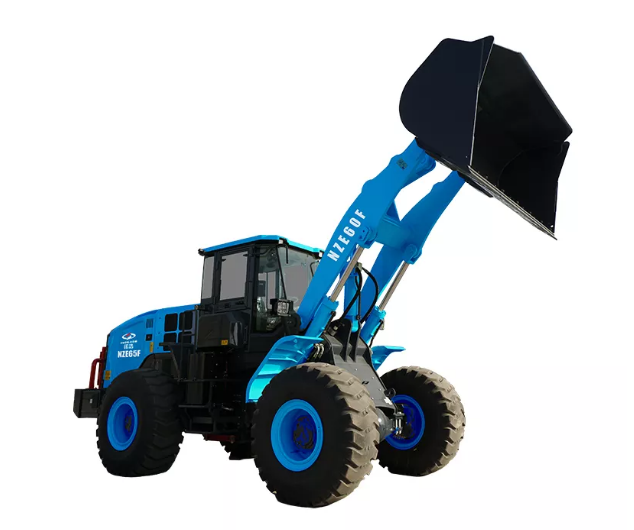Exploring the Applications for a Wheel Loader
Wheel Loader Applications
Wheel loaders serve a multitude of applications across different industries, functioning as efficient earthmoving and material-handling equipment.
For smaller projects, the choice may arise between wheel loaders and skid steers or backhoes, whereas larger commercial sites typically necessitate the use of large wheel loaders. In this guide, we'll delve into the most prevalent projects for wheel loaders and the appropriate sizes required for each job.
heavy duty mining charging electric wheel loader
Material Loading and Transporting
A primary function of wheel loaders, also known as front-end loaders, is loading and transporting materials. This encompasses earthmoving tasks such as moving sand, dirt, gravel, and other aggregates. Equipped with buckets of varying sizes, they excel at efficiently transporting these materials over both short and long distances.
Adaptable to various attachments such as forks and grapples, wheel loaders excel in a range of material transportation tasks:
Pallet Handling: Equipped with fork attachments, wheel loaders efficiently move pallets carrying bags of fertilizer, cement, or other packaged products in farmyards, warehouses, or construction sites.
Stockpiling: Utilizing their buckets, wheel loaders effortlessly move aggregates and materials from one location to another, facilitating efficient stockpiling operations.
Loading and Unloading: Specifically designed for loading and unloading materials, wheel loaders swiftly fill articulated dump trucks and other vehicles with aggregates, ensuring seamless transportation.
Landscaping and Ground Clearing
Wheel loaders, available in various sizes, are widely employed in landscaping and ground-clearing tasks due to their efficiency and capability to handle large, bulky objects effortlessly.
In forest and landscaping applications, wheel loaders are often tasked with moving logs and timber, which includes loading and unloading trucks transporting these materials.
Other tasks that wheel loaders can accomplish include:
1. Moving trees and plants: Tasks such as relocating trees and plants are made easier with attachments like tree spades, root rakes, and grapple buckets.
2. Spreading mulch and soil: Although not as efficient as tractors or skid steers, wheel loaders can still be utilized for spreading mulch and soil applications.
3. Placing rocks and other bulky materials: With the appropriate grapple bucket or attachment, wheel loaders are capable of placing and lifting bulky materials such as large feature rocks and decorations into position.
4. Ground clearing and leveling: Equipped with a variety of blades, wheel loaders can effectively clear ground and level surfaces. This includes tasks such as backfilling, soil distribution, and creating smooth surfaces.
Snow Removal
In colder regions like Canada or the Northern snow-bound states, wheel loaders are frequently employed for snow removal. Their robust buckets and powerful engines render them well-suited for clearing roads, parking lots, and various commercial spaces of snow accumulation.
Equipped with attachments like snow blades and pushers, wheel loaders can effectively push snow at different angles, scoop up snow of varying weights and sizes, and either fill trucks or create neat piles. Small models find utility in urban areas, while larger models are deployed in more rural settings.
Additionally, spreader attachments enhance the efficiency of spreading sand or salt for ice management purposes.
Agricultural Applications
In agricultural settings, wheel loaders find versatile use in transporting and hauling materials across farms. Whether it's moving hay bales, spreading manure, or loading harvested crops, smaller sizes of these machines often prove more efficient than some tractors.
Wheel loaders are adept at loading feed, grains, and fertilizers into trucks or trailers. Additionally, they excel at moving large quantities of materials, spreading gravel, and clearing debris, all of which are commonplace tasks on many farms.
Waste Management
Wheel loaders are integral to waste management operations in facilities and landfills across North America. These machines play a pivotal role in loading waste into trucks and stockpiling materials. They handle a wide range of materials, including scrap, paper, and recyclables, directing them into sorting systems.
Equipped with versatile attachments such as grapples, forks, and buckets, wheel loaders efficiently move different types of waste. They are also adept at creating well-organized piles of materials, enhancing the efficiency of waste management processes.
Mining and Quarrying
In addition to waste management, certain wheel loader manufacturers engineer models tailored specifically for the mining and quarrying sectors.
Wheel loaders intended for mining and quarrying typically boast an operating weight exceeding 100,000 pounds, necessitating robust power and stability. These industries involve handling heavy materials such as rock, ore, coal, limestone, gravel, and other aggregates, demanding enhanced capabilities.
Primarily, these loaders are utilized for tasks like loading and hauling minerals, establishing and managing stockpiles, loading raw minerals onto conveyor belts, and site cleanup and maintenance. They also contribute to road maintenance activities, including sand and gravel spreading, road leveling and grading, and other related tasks.
Road Construction
Wheel loaders are a common sight on road construction sites, valued for their size and efficiency. They play a crucial role in transporting materials around the site, loading haul trucks with materials, and managing bulk and heavy loads. Additionally, on smaller projects, they can be utilized for grading or smoothing surfaces when equipped with the appropriate bucket and blade attachment.
Building Construction
Wheel loaders play a vital role in everyday construction projects, similar to their involvement in road construction. They are utilized for transporting materials, clearing debris, and aiding in demolition tasks. Their primary function often involves site clearance for redevelopment or further construction, as well as loading haul trucks or articulated dump trucks.
Regardless of the project at hand, wheel loaders are indispensable machines that are likely to be involved in various capacities. Their effectiveness makes them versatile assets suitable for virtually any construction project imaginable.

Comments
Post a Comment